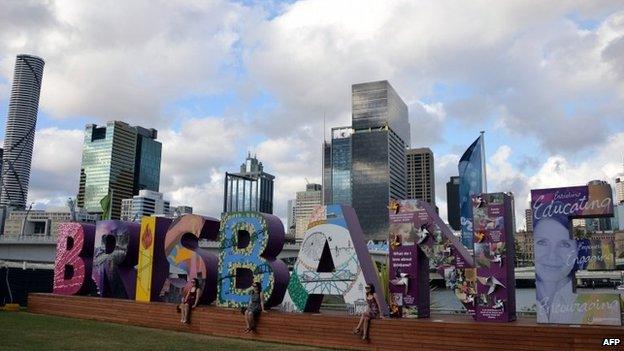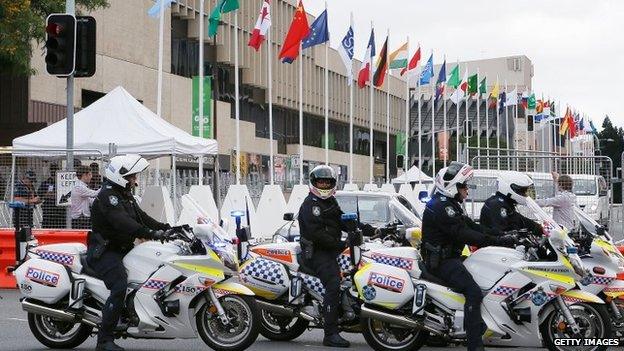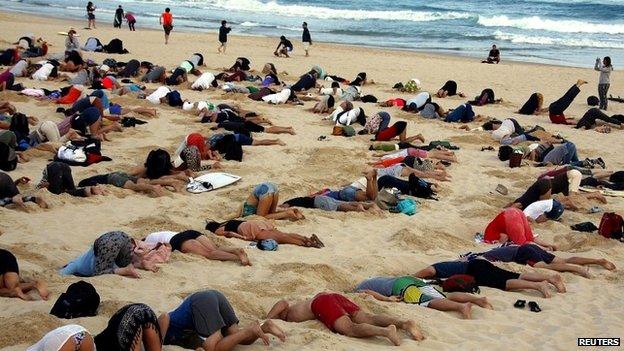G20 summit: World leaders gather in Brisbane
- Published

The Queensland city of Brisbane is hosting the two-day summit
World leaders are arriving in Australia for this weekend's G20 summit in the Queensland city of Brisbane.
The two-day summit, attended by the US, Chinese and Russian leaders among others, will focus on promoting growth.
Australian Prime Minister Tony Abbott said leaders would discuss job creation, identifying tax cheats and strengthening the global economy.
Tensions with Russia over Ukraine will also draw attention, while campaigners want climate change on the agenda.
In Brisbane, local government workers have been given a day off because of the number of travel restrictions in place. Thirteen world leaders are due to arrive in the city on Friday.
What is the point of the G20 summit? In 90 seconds
Some 6,000 police will be deployed to maintain security. Twenty-seven different groups have been given permits to protest at designated areas, with thousands of people expected over the weekend.
In early developments:
British Prime Minister David Cameron has outlined new measures to tackle jihadists who fight abroad, in an address to the Australian parliament.
Japanese Prime Minister Shinzo Abe called for closer tripartite defence ties with the US and Australia, and urged "tangible steps taken in the area of security and defence cooperation" with Canberra, in a piece for the Australian Financial Review, external.
The G20 summit will discuss world trade - as ever - but many other key subjects including Ebola appear missing.
Australia has emphasised that the summit will concentrate on the economy.
"Six years ago, the impacts of the global financial crisis reverberated throughout the world. While those crisis years are behind us, we still struggle with its legacy of debt and joblessness," Mr Abbott wrote in an article ahead of the summit, external.
"The challenge for G20 leaders is clear - to lift growth, boost jobs and strengthen financial resilience. We need to encourage demand to ward off the deflation that threatens the major economies of Europe."
Leaders are expected to expand on plans agreed in February at the G20 finance ministers' meeting to boost global economic growth by 2% in five years.
"To achieve this goal, G20 members have identified almost 1,000 new measures in their domestic growth strategies," Mr Abbott wrote.
Tax avoidance by major multinationals will also be discussed, with Australian Treasurer Joe Hockey promising "very aggressive approaches".

Security will be tight for the summit, with protests expected
No climate talks?
Australia has, however, stood firm on keeping climate change off the agenda.
"Of course climate change is hugely important and of course climate change is both a risk and an opportunity to be dealt with when discussing the global economy," Mr Hockey said on Thursday.
"But there are many issues, many issues that will help to drive economic growth and that will come from the structural reforms laid down before this meeting over the weekend."
Earlier this week, the US and China made what US President Barack Obama described as "historic" pledges on emissions, with the US promising greater cuts and China for the first time setting a date by which emissions would peak.

The protesters took to Sydney's Bondi Beach to make a statement about the global climate change debate
Mr Abbott's government, however, is facing criticism over its climate policies. It has scrapped a carbon tax and rolled back on targets for renewable energy use, in favour of paying polluters to reduce emissions.
On Thursday, more than 200 protesters buried their heads in the sand at Bondi Beach in a symbolic demonstration over climate change inaction.
Eyes will also be on Russian leader Vladimir Putin, amid tensions over Ukraine. Some Australians had called for Mr Putin to be blocked from the summit over the downing of Malaysia Airlines flight MH17.
Thirty-eight Australians were among the 298 people who died when the plane was brought down over rebel-held eastern Ukraine, by a missile that the West believes was supplied by Russia. Russia rejects the claim.
Mr Abbott, who discussed the issue with Mr Putin in Beijing earlier this week, described Russia's actions in Ukraine as part of a "regrettable pattern" by a nation that was being "much more assertive".
He said he told Mr Putin that Russia should aspire to be a superpower "for peace and freedom and prosperity" instead of "trying to recreate the lost glories of tsarism or the old Soviet Union".

What is G20?
The "Group of Twenty" represents two-thirds of the world's population, 85% of global GDP and over 75% of global trade.
It began in 1999 as an annual meeting for finance ministers and central bank governors following the Asian financial crisis, before evolving to also include a summit for countries' leaders in 2008, after the global financial crisis.
G20 meetings are aimed at deepening economic co-operation and strengthening the global economy.
It comprises 19 countries and the European Union, external.
At each meeting, the host country invites non-member guest countries to attend. For 2014, Australia has invited Spain, Mauritania, Myanmar, Senegal, New Zealand and Singapore.
